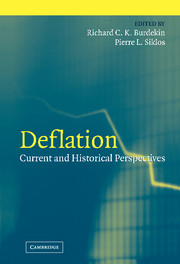Book contents
- Frontmatter
- Contents
- List of Tables and Figures
- List of Contributors
- Preface
- 1 Fears of Deflation and the Role of Monetary Policy: Some Lessons and an Overview
- PART ONE FEARS OF DEFLATION AND THE ROLE OF MONETARY POLICY
- 2 Deflation, Silent Runs, and Bank Holidays in the Great Contraction
- 3 Price Change, Financial Stability, and the British Economy, 1870–1939
- 4 Deflation Dynamics in Sweden: Perceptions, Expectations, and Adjustment During the Deflations of 1921–1923 and 1931–1933
- PART TWO DEFLATION AND ASSET PRICES
- PART THREE INTERNATIONAL PERSPECTIVES ON DEFLATION
- PART FOUR STOCK MARKET ADJUSTMENTS TO DEFLATION
- References
- Index
- Titles in the series
4 - Deflation Dynamics in Sweden: Perceptions, Expectations, and Adjustment During the Deflations of 1921–1923 and 1931–1933
Published online by Cambridge University Press: 15 December 2009
- Frontmatter
- Contents
- List of Tables and Figures
- List of Contributors
- Preface
- 1 Fears of Deflation and the Role of Monetary Policy: Some Lessons and an Overview
- PART ONE FEARS OF DEFLATION AND THE ROLE OF MONETARY POLICY
- 2 Deflation, Silent Runs, and Bank Holidays in the Great Contraction
- 3 Price Change, Financial Stability, and the British Economy, 1870–1939
- 4 Deflation Dynamics in Sweden: Perceptions, Expectations, and Adjustment During the Deflations of 1921–1923 and 1931–1933
- PART TWO DEFLATION AND ASSET PRICES
- PART THREE INTERNATIONAL PERSPECTIVES ON DEFLATION
- PART FOUR STOCK MARKET ADJUSTMENTS TO DEFLATION
- References
- Index
- Titles in the series
Summary
INTRODUCTION
Big deflations are more like singular events than realizations of some stable stochastic process. Thus, the historical particulars, including the perceptions and expectations of central decision-makers should be assessed to understand deflations. This approach is adopted in this study of the two major twentieth-century deflations in Sweden, a big one in 1921–1923 and a small one in 1931–1933. We examine three groups of actors: (1) economists that took part in public debate, (2) policy makers, and (3) wage-setters, as well as interactions between these three groups.
The evolution of the policy recommendations of the economists, actions of the policy makers, and behavior of the labor market participants before, during, and after the two deflations is traced. We focus on how their perceptions and expectations were influenced by the experience of the past. The major reason for considering both episodes of deflations is that the two deflations were close in time. This gives an opportunity to explore how the experience during the first deflation episode in the early 1920s influenced beliefs and behavior ten years later during the second deflation.
Our general framework can be represented as follows. Prevailing perceptions and expectations held by decision-makers concerning the choice and effects of economic policies are determined by the lessons from past macroeconomic episodes. These perceptions and expectations are revised when new information is obtained from new macroeconomic episodes. The economics profession, policy makers and wage setters are involved in a neverending process of adjusting their beliefs, in short in a learning process, where the interpretation of past events, that is, the lesson of the past, serves as the major source of information for revising perceptions and expectations.
- Type
- Chapter
- Information
- DeflationCurrent and Historical Perspectives, pp. 91 - 128Publisher: Cambridge University PressPrint publication year: 2004
- 12
- Cited by



